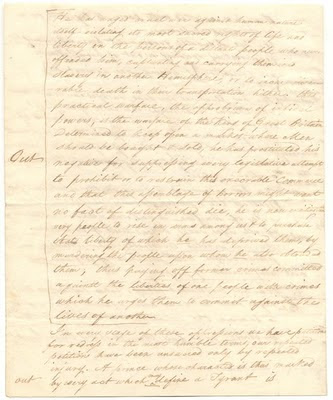Time is running out to see the Friend or Faux exhibit; its last day is July 11. In honor of the 4th, I thought I’d highlight one of the objects in the “Local Legends” section of the exhibit: the Rosenbach’s “manuscript copy of the Declaration of Independence” which shows Thomas Jefferson’s original wording and indicates the sections that were removed/amended when the document was adopted by the Continental Congress. (For more on the history of the Declaration itself, check out this online exhibit from the Library of Congress and this marked up version of the text from Duke)
The reason that our item is in Friend or Faux is that the term “manuscript copy” can be confusing and our document has frequently been misinterpreted as having been written out by Jefferson himself. It was not. Our document is a manuscript, which means simply that it was hand written. But it is not in Jefferson’s hand-writing. Instead, it is an 18th-century copy of a version of the Declaration which Jefferson sent to his friend Richard Henry Lee.
The section of the manuscript shown below is the section dealing with slavery, which as you can see by the “out” notation, was stricken from the final adopted version.

Manuscript copy of the Declaration of Independence in an unknown hand [ca. 1794] AMs 1084/7
The text of the slavery section reads:
“He has waged cruel war against human nature itself, violating it’s most sacred rights of life and liberty in the persons of a distant people who never offended him, captivating and carrying them into slavery in another hemisphere, or to incur miserable death in their transportation thither. This piratical warfare, the opprobrium of infidels powers, is the warfare of the Christian king of Great Britain. Determined to keep open a market where Men shall be bought and sold, he has prostituted his negative for suppressing every legislative attempt to prohibit or to restrain this execrable commerce and that this assemblage of horrors might want no fact of distinguished die, he is now exciting those very people to rise in arms among us, and to purchase that liberty of which he has deprived them, by murdering the people upon whom he also obtruded them: thus paying off former crimes committed against the liberties of one people, with crimes which he urges them to commit against the lives of another.”
Looking ahead to the Civil War 150, which is starting later this year, it’s worth remembering that the difficulties the Founding Fathers had in dealing with the question of slavery in the Declaration of Independence and later in the Constitution would lay the groundwork for the 19th-century tensions that would lead to the Civil War. As Frederick Douglass famously wrote, “What, to the American slave, is your 4th of July? I answer; a day that reveals to him, more than all other days in the year, the gross injustice and cruelty to which he is the constant victim.” You can read the full text of Douglass’s speech
here. At Gettysburg in 1863, Abraham Lincoln would famously hearken back to the Declaration of Independence, emphatically stating that its promises should in fact apply to all men: “Four score and seven years ago our fathers brought forth on this continent, a new nation, conceived in Liberty, and dedicated to the proposition that all men are created equal. ”
Have a great Independence Day! The Rosenbach is closed on the 4th itself so our staff can enjoy the holiday, but otherwise we’re open normally.
 Manuscript copy of the Declaration of Independence in an unknown hand [ca. 1794] AMs 1084/7
Manuscript copy of the Declaration of Independence in an unknown hand [ca. 1794] AMs 1084/7
